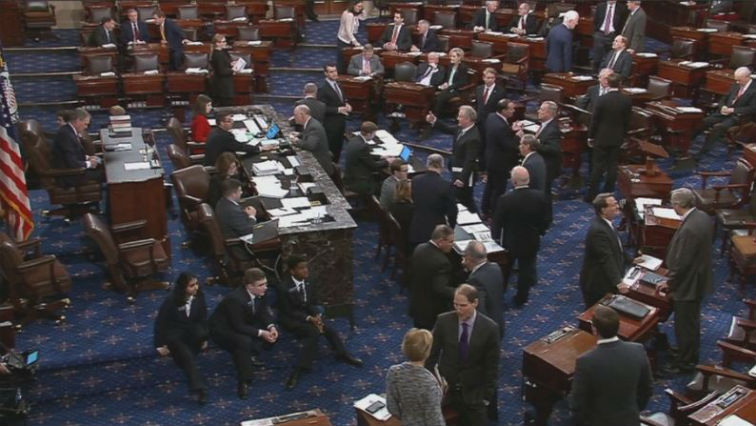In a rebuke of the President Donald Trump, the United States Senate has passed a resolution to terminate the emergency declaration on the southern border.
This follows a similar vote in the House of Representatives last month in which lawmakers voted to block the President’s attempts to reallocate government funding to build a border wall despite Congressional disapproval of such a move.
The Senate resolution passed by 59 votes to 41.
Twelve Republican Senators joined 47 members of the Democratic caucus to block President Trump’s emergency declaration that would have allowed him to reallocate government spending to begin building his border wall between the United States and Mexico.
The measures also passed the House of Representatives in late February by 245 votes to 182 and will now be sent to the White House for the President’s signature but where he’s expected to exercise his first veto since taking office.
“I’ll probably have to veto and it’s not going to be overturned and we’re gonna have our whole thing. The legal scholars all say it’s totally constitutional, it’s very important, it’s really a border security vote, it’s pure and simple, a vote for border security, it’s a vote for no crimes, see we have a border situation also but it’s slightly different from yours. Ours is not actually complex, we have very bad laws that are archaic, that were put in by Democrats and the Republicans didn’t fight hard enough at the time, that was a long time before me.”
Last minute lobbying by the White House failed sway support of Republicans for the measure, who raised concerns about the separation of powers principle that allows Congress the power of the purse.
Republican Senator Susan Collins of Maine says, “This issue is not about strengthening our border security – a goal that I support and have voted to advance. Rather, Mr. President, it is the solemn occasion involving whether or not this body will stand up for its institutional prerogatives, and will support the separation of powers enshrined in our constitution.”
The Democratic leader in the Senate Chuck Schumer moments before the vote says, “It is a crucial moment. This is a moment historians will look back on. This could be a moment that changes the fundamental balance of power in our government. So what I would ask my colleagues, I would really plead with my colleagues, I understand that the politics are difficult, much harder for you than for me… but our nation, our constitution, the beauty of this government demands that we rise to the occasion.”
The legislation was first passed by the Democratic -led House of Representatives where Nancy Pelosi is the Speaker.
Pelosi says, “This isn’t about the border, this is about the Constitution of the United States. This is not about politics, it’s not about partisanship, it’s about patriotism. All members as I say have taken the oath of office, we would be delinquent in our duties if we did not resist, we did not fight back and to overturn the president’s declaration.”
In a small victory for the White House, Republicans were able to keep the votes below the two-thirds threshold.
Had the backers of the bill been able to reach 67 votes in the Senate, that would’ve been enough to override the expected presidential veto; necessitating a second vote in the House of Representatives where the prospect of achieving two thirds or 290 votes in favour of the resolution are even slimmer.
An additional 45 Republican lawmakers in the lower house would have to change their no votes to yes – an unlikely prospect that now leaves the Courts to pronounce on the legality of the emergency declaration.





